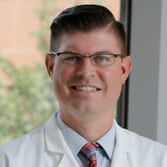Researcher Spotlight: Timothy Voorhees, MD
THE OHIO STATE UNIVERSITY COLLEGE OF MEDICINE
Schroder Family Scholar

Post-transplant lymphoproliferative disorders (PTLD) are an aggressive group of lymphomas that occur in the setting of immunosuppression after solid organ transplant. There are very few treatment options available to patients who do not respond to or relapse after initial treatment for PTLD. “I am developing a trial to evaluate the safety and efficacy of treating patients with relapsed or refractory PTLD with a novel bispecific antibody, epcoritamab,” explains Dr. Voorhees. “This drug targets the lymphoma and the patient’s immune system to create an immune response at the location of the disease.” Through this research, Dr. Voorhees hopes to improve outcomes for people with relapsed/refractory PTLD.
Dr. Voorhees’ interest in lymphoma began early in his academic career when he had the opportunity to work in an immunology lab studying immune cell function. “I found this fascinating and as I approached medical school, I knew that I wanted to find a place in medicine to utilize these skills,” he says. He earned his medical degree from the Ohio State University College of Medicine. After completing a fellowship in Hematology and Oncology at the University of North Carolina, he returned to the Ohio State University, where he now serves as an Assistant Professor of Clinical Internal Medicine. He also holds a Master of Science in Clinical Research from the University of North Carolina.
Dr. Voorhees’ passion for lymphoma research is driven by his interactions with his patients and their families. “I absolutely love taking care of my patients, and there is nothing better than designing a trial to provide new treatments for patients with the possibility of better outcomes and a better tolerated treatment,” he says. He is excited by the advances that have been made in cellular and bispecific antibody therapies and looks forward to a career leveraging these therapies to help his patients. “I think we have only scratched the surface of our understanding of how to best manipulate the immune system to treat lymphoma,” he says. “There will be many exciting trials to come as these advancements are evaluated in the future.”

